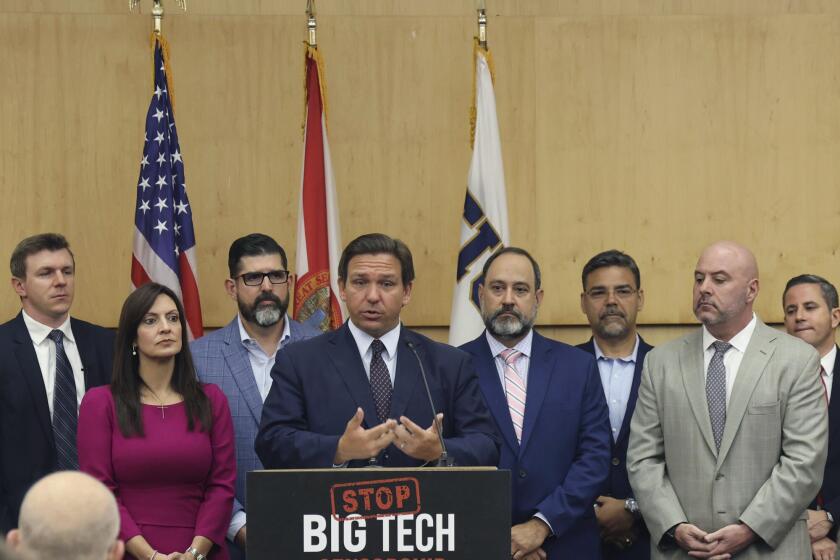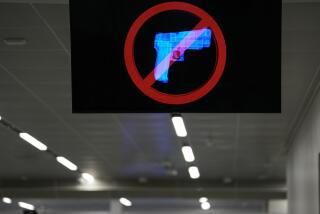Opinion: When does government speech violate the 1st Amendment?

- Share via
As a dean of a public university law school, do I violate my students’ free speech rights when I encourage them to speak respectfully to one another, to demonstrate civility and to refrain from hateful expression? There are countless instances in which government officials speak out — does that chill freedom of expression among those who disagree with what an official says? In two Supreme Court cases this term, including one decided Wednesday, the justices rightly reaffirmed that speech by government officials violates the 1st Amendment only if it includes an explicit threat of sanctions.
Casting aside claims that conservatives are censored, Supreme Court dismisses lawsuit from Republican state attorneys.
The Supreme Court last dealt with this issue in 1963, in Bantam Books vs. Sullivan. That case involved a Rhode Island Commission to Encourage Morality in Youth that identified “objectionable” books and wrote to sellers urging them to stop selling those books. The letter also informed the recipient that the commission recommended obscenity cases to prosecutors and turned its list of distributors of objectionable books over to local police. In fact, a police officer often followed up and visited booksellers to see what actions had been taken. The Supreme Court found that such pressure constituted an unconstitutional infringement of speech, even though no books were actually banned and no prosecutions undertaken.
In National Rifle Association vs. Vullo, decided on May 30, the court applied the Bantam Books decision, allowing a suit to go forward against Maria Vullo, who had been the superintendent of the New York Department of Financial Services. After the Parkland, Fla., school shooting in which 17 students and staff members were killed, Vullo encouraged insurance company and bank officials, whom she regulated, to no longer do business with the NRA: Vullo wouldn’t pursue prosecutions against the businesses in exchange for the businesses ceasing their relationships with the NRA.
In a unanimous ruling, the Supreme Court found that the NRA had a 1st Amendment claim. Justice Sonia Sotomayor wrote for the court, reaffirming Bantam Books vs. Sullivan: “Government officials cannot attempt to coerce private parties in order to punish or suppress views that the government disfavors.”
The feds’ challenge is to find ways to fight the spread of disinformation, which can threaten public safety, without jeopardizing freedom of expression.
On Wednesday, in Murthy vs. Missouri, the court considered a suit brought by two state governments and five social media users against the Biden administration and many federal agencies, claiming that the 1st Amendment was violated by the government’s encouraging social media platforms to take down false speech. No platform was threatened with or relieved of prosecution, but the businesses were told that if they did not take down false speech — especially about the effects of the COVID-19 vaccines and the 2020 presidential election — they would face more regulation in the future.
A conservative panel of the U.S. Court of Appeals for the 5th Circuit found that this amounted to a violation of the 1st Amendment. But 6-3, the Supreme Court ordered the case dismissed for lack of standing. (In order to have standing to sue in federal court, a plaintiff must show that he or she has been injured, that the injury was caused by the defendant, and that a favorable court decision is likely to remedy the harm.)
The Supreme Court said that none of the plaintiffs could show that social media companies took down false speech because of coercion from the government, so where was the harm? The court stressed that the “platforms had independent incentives to moderate content and often exercised their own judgment.”
Opinion: How the Supreme Court should rule on Texas and Florida laws against social media moderation
The cases, NetChoice vs. Paxton and Moody vs. NetChoice, concern Florida and Texas laws prohibiting moderation by platforms such as Facebook and YouTube.
Although the Murthy decision is based on standing, it nonetheless has crucial implications for the 1st Amendment. Indeed, Justice Samuel Alito, in his dissent, described this as “one of the most important free speech cases to reach this Court in years.” The premise of the majority decision is that social media companies are private entities and can decide for themselves what speech to carry and what to remove. The government encouraging them to remove false speech only violates the 1st Amendment if it can be proved that the government caused, and will cause in the future, speech to be blocked.
Both the NRA case and the social media case reaffirm that the speech of government officials violates the 1st Amendment only if it is coercive and only if it can be proven to cause harm. That means that public university deans like me need not fear a 1st Amendment violation for encouraging responsible speech by my students.
These decisions are especially important in the context of the internet and social media, where false speech is a huge problem. The government has few tools to deal with it. The court’s rulings preserve the ability of officials to encourage social media platforms to take down false speech.
Less false speech on the internet and social media will benefit all of us.
Erwin Chemerinsky is a contributing writer to Opinion and dean of the UC Berkeley School of Law.













